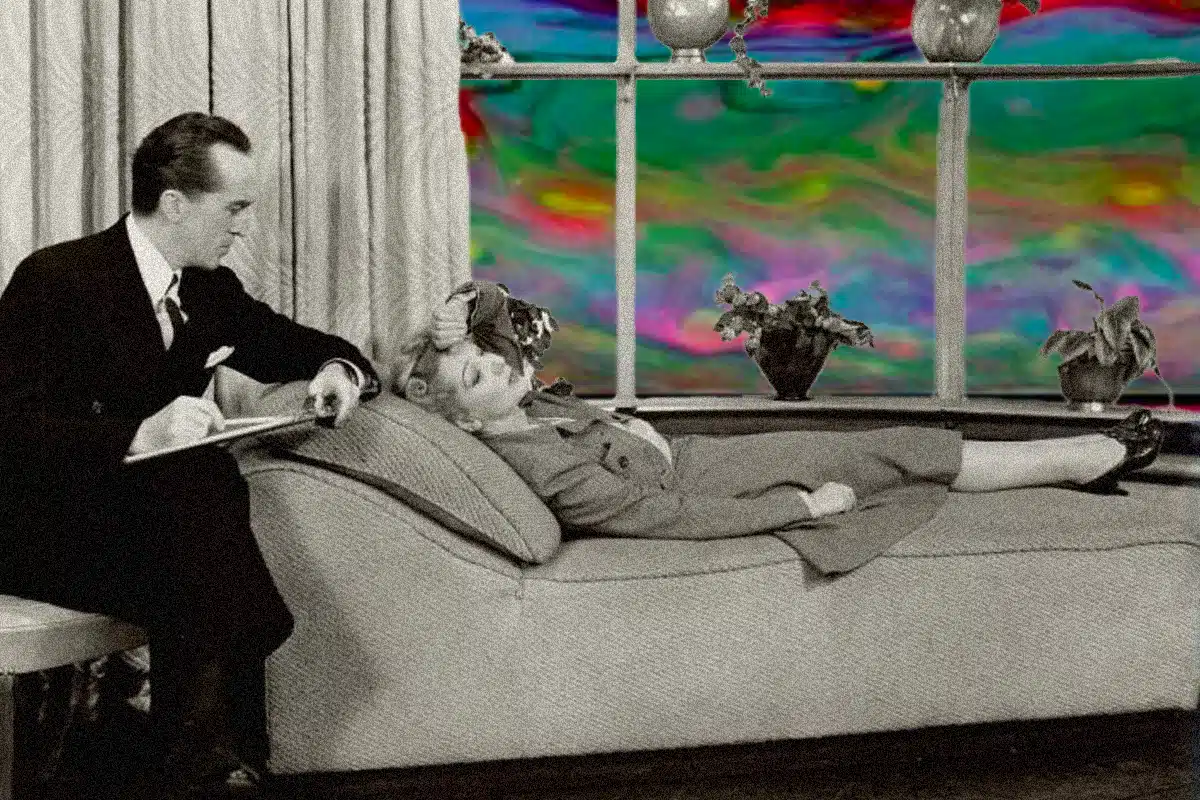Psychedelics are still inching their way through the mire of research and legislation toward use in therapy. While it may be too soon for many therapists to legally facilitate psychedelic experiences outside of clinical trials, mental health professionals can pursue training to help clients make sense of a psychedelic experience after the fact, earning the role of a “psychedelic integration therapist” through specialized certification programs.
For professionals looking to take their first step into the door of psychedelic therapy, it’s important to first understand what psychedelic integration is—and what it is not.
Psychedelic integration therapy is the process by which a mental health professional supports a client in “metabolizing” material that arose in their altered state of consciousness, which often involves gathering insights to carry into daily life. It does not involve actively guiding an individual through altered states and can be thought of as the “aftercare” of a psychedelic experience.
This is not the same as psychedelic-assisted psychotherapy, which refers to the treatment of mental health issues through medically administered psychedelics (i.e., MDMA, ketamine, psilocybin) and carefully structured protocols. While psychedelic-assisted therapy includes an integrative phase, it demands a broader area of expertise and more rigorous training.

There are other psychedelic-related modalities as well. Ketamine, a dissociative anesthetic with a less restrictive scheduling in the U.S., is sometimes used in conjunction with psychotherapy. Oregon is in the process of licensing facilities for supported adult-use psilocybin sessions: Facilitators must complete a training program, but a formal therapy degree is not required. Colorado is following suit. Voters legalized supported adult use in November of 2022. Both one-on-one and community-based psychedelic experiences are often facilitated by underground guides or spiritual leaders. Psychedelic retreats may employ trained therapists—or guides, coaches, or cultural leaders.
READ: How to Vet Your Guide
In this article, we’ll focus on psychedelic integration therapy as a formal therapy practice. By and large, psychedelic-assisted psychotherapies are not legal beyond the walls of clinical trials in the U.S. For therapists who want to better support the millions of people who have already had a psychedelic experience, psychedelic integration therapy may offer a path forward.
How to Grow Shrooms Bundle
Take Both of Our Courses and Save $90!
Requirements for Psychedelic Integration Training
The first question for a lot of hopeful practitioners is, am I qualified to offer psychedelic integration services? That depends on where you are in the world and respective legal parameters defining who can provide what to clients.
In the U.S., for example, protocols for various levels of psychedelic support are gradually being developed. Because integration involves talking about the insights of psychedelic experience—with no substance facilitation, advice, or referrals—it’s a more accessible offering for today’s therapists.
Dr. Ingmar Gorman is a psychologist and co-founder of Fluence, an education program that equips clinicians with training in psychedelic-assisted therapies and integration. “Therapists often believe they need to participate in clinical trials or administer psychedelics directly to be involved in psychedelic therapy,” Gorman told DoubleBlind. “Psychedelic integration is a practice they can provide now, legally, and is in demand considering the increasing rates of psychedelic use.”

Some integration certificate programs enroll only licensed mental health therapists. Others are tailored for a broader range of unlicensed helping professionals like coaches, guides, and sitters.
“Some people will disagree with me, but I believe one should have training in psychotherapy prior to practicing psychedelic integration therapy as a clinician,” Gorman said. “Learning the basics of clinical practice, while also studying more advanced skills related to psychedelic preparation and integration can be very challenging. These skills come from experience and practice, being in clinical situations, and learning one’s own strengths and areas in need of growth.”
READ: How To Become A Psychedelic Therapist
What Does a Psychedelic Integration Therapist Do?
Imagine you’ve just had a profound psychedelic experience over the weekend. On Monday, you wake up to the sound of your alarm, get ready for work, and wade through what should feel ordinary but somehow feels different. In the coming days, you notice shifts in your relationships, unfamiliar emotions, and a looming cloud of dissatisfaction roll over your workdays. You feel like it’d be a good idea to talk to someone, but who?
Deanna Rogers is a practitioner who facilitates psychedelic integration in private practice and trains others through Numinus, following 10 years of experience working at ayahuasca retreats through Temple of The Way of Light. Rogers describes her own powerful ayahuasca experience that left a trail of difficulties to work through. That path eventually led her to working with psychedelics and integration.
“Integration is both bridging the content from the ceremony into everyday life, but it is also working with what continues to come up and unfold for the client,” Rogers said. “Psychedelics can offer an opening, and this continues to bring things up post-experience.”
Dr. Ido Cohen—a clinical psychologist, therapist, and co-founder of the Integration Circle—echoes the continuously unfurling nature of discovery in integration. “The role of the therapist is to encourage curiosity and openness—to see the experience has not ended yet,” he said. “We have time to implement [the insights] we gain, and to have these insights as resources [we] can always come back to.”

Again, a psychedelic integration therapist does not and cannot provide, guide, recommend, or connect clients with illegal substances. Even discussion of a client’s psychedelic use requires a delicate approach, hence why integration is often taught coupled with a harm reduction perspective.
“Part of the harm reduction philosophy is that people are going to make choices,” Rogers said. “For the therapist, there’s considerations of your license. What can you talk about? What can you not talk about?”
Rogers points out that this may be less of an issue with integration, as clients typically seek support after a psychedelic experience, but underlines the need for therapists to remain intentional with what they are willing to discuss. In other words, the harm reduction therapist aims to inform, not direct, the client in such a way that prioritizes their safety and autonomy.
“Clients will often ask therapists directly for guidance related to psychedelics. For example, how much of what psychedelic they should take, or which retreat is ‘the best,’” Gorman said. “There can be a temptation for a therapist to make recommendations, rather than provide the necessary information for a client to make their own decision.”
While considering a practice of psychedelic integration, it’s recommended to familiarize yourself with the legal and ethical implications of the work, as well as the potential risks of being adjacent to a client’s psychedelic use in a world where these substances are legally prohibited in most places.
All of this probably paints a fairly vague picture of what psychedelic integration looks like in the therapy room, and there’s a reason it’s difficult to describe exactly how integration work looks between therapist and client.
“That’s one of the messy things about the field,” Rogers said. “The beauty of it is that there isn’t one approach to integration.” She adds that her personal approach to integration involves a somatic lens—that is, understanding how nervous system functioning relates to the dysregulated states some clients find themselves in during or after a psychedelic experience.
How to Grow Shrooms Bundle
Take Both of Our Courses and Save $90!
Cohen describes integration as “already blending with many therapeutic approaches,” which is evident when looking at the transtheoretical framework of emerging integration modalities. The Psychedelic Harm Reduction and Integration (PHRI) model, for example, blends principles from integrative harm reduction, psychedelic-assisted psychotherapy, mindfulness, and psychodynamic theory—which focuses on self-reflection and self-examination— to intentionally address the many unique challenges and insights gleaned from psychedelics.
READ: What Is Psychedelic Integration Therapy?
Psychedelic Integration Training
In the world of therapy, a term called “scope of practice” describes where professional expertise begins and ends. It’s an ethical imperative that therapists are crystal clear about which modalities they are formally trained in. Overstating one’s specializations not only damages the credibility of the therapy field, but can also cause harm to clients (no wonder it’s a common therapist peeve).
“At Fluence, we seek to train licensed mental health professionals because we want our alumni to have a regulated scope of practice they can work within,” Gorman said. “This protects clients who are seeking psychedelic integration therapy by ensuring ethical oversight, consequences for inappropriate therapist behavior, and federally protected confidentiality of private information.”
Many therapists complete additional training to expand competence in issue areas they’d like to work with, knowing that different issues come with their own unique ethical, legal, and clinical intricacies. Just as a therapist can attain extra certification to work with issue areas like addiction, or treatment approaches like EMDR, integration training is intended to give therapists the fundamentals in psychedelic aftercare.
With some certificates, there are overseeing entities regulating the curriculum and requirements to ensure that trainees receive a standardized quality and range of learning objectives. But this is not yet applicable for psychedelic integration. For this reason, an aspiring integration therapist should carefully review the principles, objectives, and curriculum of a psychedelic integration certificate program and see how they align with the ethics of the field as well as your values as a counselor.
READ: Why the “Psychedelic Renaissance” is Just Colonialism By Another Name
Cultural Competence and Humility
Clients carry their own unique worldviews, backgrounds, identities, and cultural values. Likewise psychedelics and those who have used them carry a history steeped in colonization, prohibition, and appropriation—a history that not only intersects for clients at the individual level of integration, but systemic levels, too, as psychedelics enter the medical industrial complex.
“Programs today should offer training that includes acknowledgment and honoring of the origins of some entheogens such as psilocybin, ayahuasca, peyote, and iboga,” Cohen said. “Then there is a need to discuss how racial, cultural, and intergenerational issues might arise in the preparation and integration process, and how to work with it.”
Nodding to the long history of psychedelics that predates what is sometimes called the modern “psychedelic renaissance,” Rogers highlights that preparation and integration are naturally embedded in indigenous ceremony—bridges to which are often left unbuilt in current conversations of the medicalization of psychedelics. “This idea of preparation, experience, ceremony, and then integration…that arc naturally comes from an indigenous context.”
Rogers describes the importance of cultural humility and humility in general. “Sometimes as professionals, culturally, we’re not very good at admitting what we don’t know,” she said. “It can really mess up someone if you give them too much too fast, or if it’s not done with a lot of care.”
“Therapists may rely on their own experience with psychedelics and assume what is best for their client,” Gorman said, emphasizing the ways in which overidentification or countertransference enter integration work as much as it can other types of therapy. These terms refer to the ways in which a therapist’s personal experiences and bias inevitably project into the counseling relationship, necessitating ongoing self-reflection and consultation to make sure assumptions don’t negatively impact treatment.
Trauma-Informed
Psychedelics can evoke powerful emotions, memories, and material, so it follows that therapists would ask for training programs to impart trauma-informed approaches to integration.
“While it takes many years to be trained to work with trauma in an educated and experienced framework, any good training program should include a lengthy portion of its curriculum to trauma training,” Cohen said. “A therapist should know how to hold [emotional] charges without being fast to bypass the process.”
“A psychedelic-drawn [non-ordinardinary state of consciousness] can work as a powerful catalyst, stirring up deep mental and emotional issues,” authors including Dr. Gorman wrote in a 2021 paper on PHRI. “The importance of a difficult or traumatic experience and a patient’s related insights should be validated and met with compassion by the integration therapist.”
For integration therapists, taking a trauma-informed approach may include recognizing trauma responses as they arise in the integration process, engaging support through co-regulation and safety-building strategies, and reducing risks of retraumatization—which includes adequate training in trauma.
Spirituality
Finally, let’s not forget that psychedelics have a knack for evoking ineffable mystical experiences, sometimes so profound that some individuals consider it one of the most meaningful personal or spiritual experiences of their lifetime. Whether or not a client already has a spiritual or religious framework for understanding it, clinicians should be able to meet them in their experience.
“Often folks have spiritual experiences, and coming from a Western lens, they’re unsure how to integrate that,” Rogers said.
When reviewing psychedelic integration programs, you might pay attention to the ways in which spirituality blends into the curriculum to support clients experiencing spiritual emergence, and how to create a therapeutic container for this unfolding with your client.
“Trainings should teach how such experiences have been understood by indigenous and shamanic cultures,” Cohen said. “Incorporating an overview of psychological and spiritual traditions that saw the value and potential of these psychedelic states can also help a therapist in future sessions.”
READ: Consent is Psychedelic. Here’s Why.
Psychedelic Integration Certification
Counseling programs generally do not offer education or training in psychedelics in their core curriculum. It’s possible that a school may offer a special topics course on related theories or psychedelics, but you’ll likely be looking to separate certificate programs for adequate training in integration.
Below is a list of programs currently offering training in psychedelic integration and related areas of expertise. You’ll notice they vary in length, cost, format, and curriculum, and different programs might be right for different practitioners. Practitioners are encouraged to research them fully to make sure it’s the right fit, with the understanding that regulations and certification requirements for future psychedelic-assisted therapy are still pending.
- Fluence: Postgraduate Certificate in Psychedelic Harm Reduction and Integration
- Numinus: Psychedelic Harm Reduction and Integration (PHRI) Training
As states like Oregon and Colorado begin to change their policies around psychedelics, more training programs are emerging—and their scope spans beyond integration. New programs like Vital and Alma seek to prepare facilitators in advance of Oregon’s new policies. The Multidisciplinary Institute of Psychedelic Studies (MAPS) has trained therapists in MDMA-assisted psychotherapy for a number of years. Naropa offers a Certificate in Psychedelic-Assisted Therapies and Research.
These programs—which represent a small sampling of what is emerging— place more emphasis on preparing clinicians for facilitating psychedelic experiences, as well as post-session integration. Yet, given that many psychedelic therapy programs are still in fledgling phases—and sometimes with little oversight—it’s important to properly vet and research any programs you hope to enter. Learn more about what to look for in psychedelic therapy training programs here.
Note that DoubleBlind does not endorse any particular practitioner training program—links are provided for informational research purposes only.
Interested in having a psychedelic experience, but don't know where to start? Get our definitive guide on trusted legal retreat centers, clinical trials, therapists, and more.



